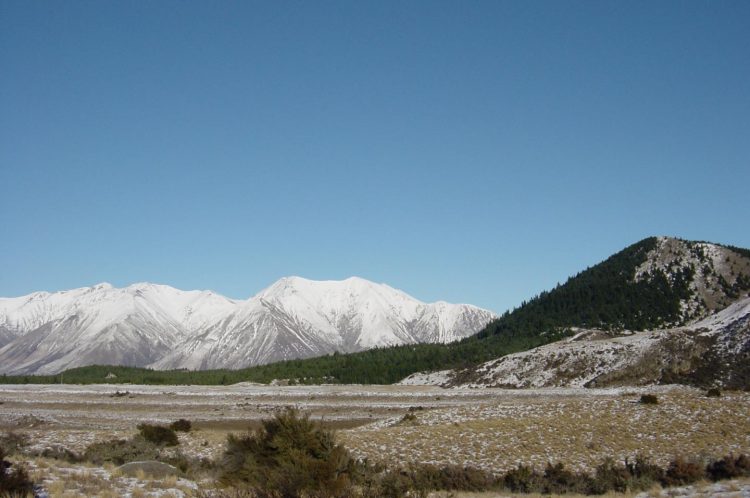'Big data' takes root in the world of plant research

Black pine (Pinus nigra), one of the species whose life history data is part of the database, is seen against a stunning backdrop of New Zealand. Credit: Yvonne Buckley
They clubbed together with like-minded individuals working across five different continents to compile the huge database of plant life histories, for which data have been gathered over a near 50-year span.
At a time in which climate change and increasing human populations are rapidly re-shaping plant distributions, the researchers hope their COMPADRE Plant Matrix database will foster collaborations between scientists and allow them to better answer questions such as how we can conserve the species that are critical for ecosystem services, and which may provide food for billions.
The researchers have just published an article in the prestigious international, peer-reviewed publication Journal of Ecology that describes the database. By making the precious data it contains free to download, they hope to inspire and accelerate important global research on plant biology.
“We hope that other scientists will use these data to answer questions such as why, unlike humans, some plants don't deteriorate as they age, why some environments are better for agriculture than others, and how fast plant populations will move in response to climate change,” said Professor of Zoology in Trinity's School of Natural Sciences, Yvonne Buckley.
She added: “Making the database freely available is our 21st Century revamp of the similarly inspired investments in living plant collections that were made to botanic gardens through the centuries; these were also set up to bring economic, medicinal and agricultural advantages of plants to people all over the world. Our database is moving this gift into the digital age of 'Big Data'.”
We are used to shops, websites and companies keeping track of our purchases, what we eat, who we date, and even when and how we exercise. Keeping track of the most intimate details of life, death and reproduction should not be unique to human populations, though.
We rely on plants for some of our most basic needs like food, shelter and clothing. It is therefore vital that we know the 'hows', 'whys' and 'wherefores' governing the success of a diverse range of plant species so that we can protect them and put them to use for the good of the world.
The COMPADRE database contains far more information than one person could ever hope to pull together over a lifetime. The data have been collected over the past 48 years by many scientists on five continents, with sites ranging from the searing heat of deserts to the freezing cold of arctic and alpine plant communities. As a result, there are almost infinite questions for researchers to explore.
The Max Planck Institute for Demographic Research (MPIDR) funded a lot of the data collection. The MPIDR is world renowned for its work on human population change, ageing and fertility, as well as the demography of animals and plants.
The journal article will be freely available (http://onlinelibrary.wiley.com/doi/10.1111/1365-2745.12334/abstract) after the embargo has lifted, and the COMPADRE Plant Matrix database will be freely available to download (http://www.compadre-db.org/)
Media Contact:
Thomas Deane, Press Officer for the Faculty of Engineering, Mathematics, and Science, Trinity College Dublin, at deaneth@tcd.ie or Tel: +353-1-896-4685
Yvonne Buckley, Professor of Zoology, Trinity College Dublin, at buckleyy@tcd.ie or Tel: +353-87-931-7638
** Professor Buckley is available for interview **
** Journal Article DOI = 10.1111/1365-2745.12334 **
About Trinity College Dublin
Trinity College Dublin, founded in 1592 is Ireland's oldest university and today has a vibrant community of 17,000 students. It is recognised internationally as Ireland's premier university. Cutting edge research, technology and innovation places the university at the forefront of higher education in Ireland and globally. It encompasses all major academic disciplines, and is committed to world-class teaching and research across the range of disciplines in the arts, humanities, engineering, science, social and health sciences.
Trinity is Ireland's leading university across all international rankings, and was ranked 61st globally in 2013 QS World University Ranking http://www.tcd.ie
Media Contact
All latest news from the category: Life Sciences and Chemistry
Articles and reports from the Life Sciences and chemistry area deal with applied and basic research into modern biology, chemistry and human medicine.
Valuable information can be found on a range of life sciences fields including bacteriology, biochemistry, bionics, bioinformatics, biophysics, biotechnology, genetics, geobotany, human biology, marine biology, microbiology, molecular biology, cellular biology, zoology, bioinorganic chemistry, microchemistry and environmental chemistry.
Newest articles

Bringing bio-inspired robots to life
Nebraska researcher Eric Markvicka gets NSF CAREER Award to pursue manufacture of novel materials for soft robotics and stretchable electronics. Engineers are increasingly eager to develop robots that mimic the…

Bella moths use poison to attract mates
Scientists are closer to finding out how. Pyrrolizidine alkaloids are as bitter and toxic as they are hard to pronounce. They’re produced by several different types of plants and are…

AI tool creates ‘synthetic’ images of cells
…for enhanced microscopy analysis. Observing individual cells through microscopes can reveal a range of important cell biological phenomena that frequently play a role in human diseases, but the process of…





















